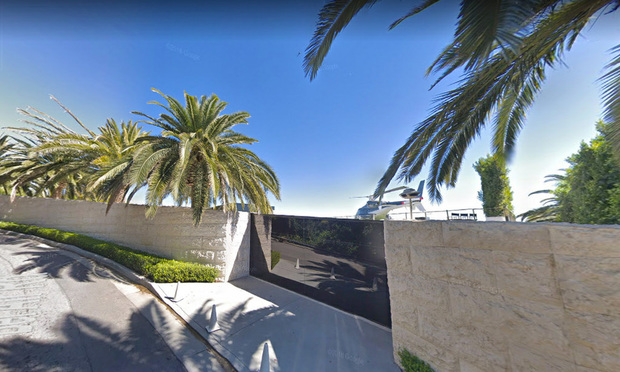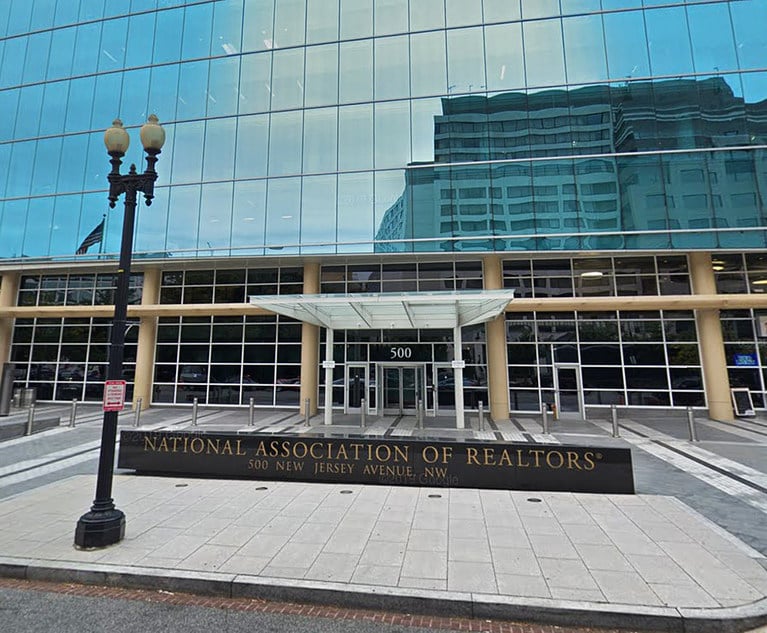Daily Dicta: Zillow (and Winston & Strawn) Hits Back in Fight over $150M LA Mansion Listing
"Critically, Bel Air does not allege anywhere in the complaint that any potential buyer—let alone a willing and able buyer with $150 million to spend and the immediate need for a helipad and 'three gourmet kitchens'—saw the erroneous information."
April 30, 2019 at 12:20 PM
7 minute read
 924 Bel Air Rd, Los Angeles, CA 90077
924 Bel Air Rd, Los Angeles, CA 90077
Let's say you're in the market for a new house, with a budget of, oh, $150 million.
What do you suppose the odds are that you'd rely solely on real estate web site Zillow for information about prospective properties—you know, ones with 21 bathrooms and a helipad and four-lane bowling alley and 40-seat movie theatre, that also include an “auto gallery” with $30 million worth of cars and—hey why not—a giant wall of candy?
Right.
And yet, that's one premise behind a $60 million negligence lawsuit against Zillow by a spec developer who is having a hard time selling an over-the-top luxurious 38,000-square foot mansion in Los Angeles.
 My first reaction was that this is another inductee for my stupid lawsuit hall of fame. But maybe it's not that simple. After all, people file lawsuits for all sorts of reasons, not just because they think they have an iron-clad case.
My first reaction was that this is another inductee for my stupid lawsuit hall of fame. But maybe it's not that simple. After all, people file lawsuits for all sorts of reasons, not just because they think they have an iron-clad case.
And this litigation has prompted a flurry news stories about the house at 924 Bel Air Road in publications including The Washington Post, Forbes, MSN, the Chicago Tribune, even the U.K.'s Daily Mail.
We're talking photos and breathless descriptions of the property such as this one in the Los Angeles Times on Friday: “It's hard to overstate the opulence…Perched above Bel Air, the four-story mansion offers a world of pure imagination within its walls.”
You can't buy that kind of publicity.
“We exposed a huge flaw in Zillow's screen system that is not subject to immunity. We didn't file the lawsuit for publicity, we filed it for damages,” said plaintiff's counsel Ronald Richards of The Law Offices of Ronald Richards and Associates in an email. “My client's home was severely damaged by the lack of screening procedures.”
He's suing the real estate website in U.S. District Court for the Central District of California on behalf of home builder Bruce Makowsky's LLC, which owns the Bel Air property.
A spokeswoman for Zillow, which is represented by Winston & Strawn, said, “While we won't discuss pending litigation, I can tell you that Zillow goes to great lengths to display current and accurate data on our site. When we hear about any issue, we work to resolve the issue as soon as possible.”
The Bel Air house first came on the market fully furnished in early 2017 with a list price of $250 million—the most expensive home in the nation at the time. It didn't sell, and the price was eventually dropped to $150 million.
According to the suit, earlier this year, someone with a Chinese IP address and fake phone number hijacked the Zillow listing and reported the house had been sold on Feb. 4 for $110 million. Soon after, the hacker changed the Zillow listing again, reporting the house sold on Feb. 9 for $90.54 million, and then on Feb. 10 for $94.3 million.
Why would someone do this? The plaintiff offers no explanation. (Chinese hackers do the darndest things?)
It took Zillow about a week to correct the erroneous information, Makowsky's lawyers said—too slow! And now they contend that it's Zillow's fault the house hasn't sold.
“Potential buyers believe that the property in fact was sold and the market is now permanently infected with false information that the property sold below $100M, $60M under the listing price,” Richards wrote in the complaint. “It is a very small market in this space. For the property to be labeled sold numerous times millions of dollars below the listing price corrupts the listing price dramatically.”
Richards also said Zillow lacked proper safeguards to prevent such tampering.
“Defendants knew or should have known that trolls, criminals, and persons illegally claiming ownership of property and falsely contending it was sold that could easily bypass their standard questions to 'claim a home' and post false information. It was reasonably foreseeable that this would happen. Yet, the defendants have done nothing about it and simply do not care about the homeowners they hurt in the process.”
So…a few problems.
Winston & Strawn's Sean Meenan, Heather Lamberg and Lev Tsukerman just hit back with a motion to dismiss that shredded the complaint five different ways.
The Winston lawyers argue that Zillow is protected by the safe harbor provision of the Communications Decency Act. The law shields online services from getting sued for publishing third-party user-generated content. “This is a classic case of CDA immunity, warranting dismissal with prejudice on this basis alone,” they said.
The plaintiff's lawyers with little elaboration argued that the 1996 law is “outdated,” but the Winston team counters that it's “very much alive and well.”
Zillow fits all the criteria for protection, they said. It's an “interactive computer service,” and the Bel Air plaintiff is trying to hold it liable for allowing a third party to publish incorrect information on its website—“whether it is the publication itself or the allegation of inadequate safeguards to protect against false publication.”
But let's say the court finds the Communications Decency Act doesn't apply. The Winston team argues that the negligence claim still fails on the four required elements: 1) duty; (2) breach; (3) causation; and (4) damages.
First of all, they argued, Zillow has no legal duty to protect Bel Air from the misconduct of third parties.
“Bel Air has not alleged—nor can it—any facts that would support the existence of a special relationship between Bel Air and Zillow. If anything, the facts alleged in the complaint establish the opposite: Bel Air's property is one of more than 110 million contained in Zillow's database,” they wrote. “Bel Air also offers (without further factual detail) that 'consumers rely on [Zillow] for real estate information'—but this goes to Zillow's relationship with those consumers, not Bel Air.”
Okay, but let's say there was a duty. Did Zillow breach it by being negligently unresponsive?
The Bel Air plaintiff in an exhibit includes emails between Richards and a Zillow representative. The emails show the Zillow rep responded to the original complaint on Feb. 7 that afternoon, promising that its technical staff was “working towards a resolution.” By Feb. 12, all the fake information was removed.
By Zillow's reckoning, that counts as responsive.
What about causation? Was Bel Air harmed by Zillow's supposed negligence?
This is where, in my mind, the bottom drops out.
“Critically, Bel Air does not allege anywhere in the complaint that any potential buyer—let alone a willing and able buyer with $150,000,000 to spend and the immediate need for a helipad and 'three gourmet kitchens,'—saw the erroneous information during the period of time in which it was allegedly viewable,” the Winston lawyers wrote. “Nor does it plausibly allege that any buyers were discouraged from purchasing the property as a result of that information.”
They continued, “Indeed, the implication that a potential buyer in this 'very small market' would decide whether or not to make a $150,000,000 financial investment based on a brief review of a Zillow listing stretches the word 'plausibility' beyond its limits.”
This content has been archived. It is available through our partners, LexisNexis® and Bloomberg Law.
To view this content, please continue to their sites.
Not a Lexis Subscriber?
Subscribe Now
Not a Bloomberg Law Subscriber?
Subscribe Now
NOT FOR REPRINT
© 2025 ALM Global, LLC, All Rights Reserved. Request academic re-use from www.copyright.com. All other uses, submit a request to [email protected]. For more information visit Asset & Logo Licensing.
You Might Like
View All
Latham's 7-Year Fight to Reshape New York City Property Taxes

Litigators of the Week: Plaintiffs Reach a $418M Market-Shifting Settlement With Realtor Group

How This Kirkland Partner Pushed Past a Flat Tire and Glitchy Tech to Deliver a Winning Argument for Sotheby's

Litigators of the Week: Trump Org Prosecutors Secure Across-the-Board Guilty Verdict in Tax Fraud Trial
Trending Stories
- 1Public Notices/Calendars
- 2Wednesday Newspaper
- 3Decision of the Day: Qui Tam Relators Do Not Plausibly Claim Firm Avoided Tax Obligations Through Visa Applications, Circuit Finds
- 4Judicial Ethics Opinion 24-116
- 5Big Law Firms Sheppard Mullin, Morgan Lewis and Baker Botts Add Partners in Houston
Who Got The Work
J. Brugh Lower of Gibbons has entered an appearance for industrial equipment supplier Devco Corporation in a pending trademark infringement lawsuit. The suit, accusing the defendant of selling knock-off Graco products, was filed Dec. 18 in New Jersey District Court by Rivkin Radler on behalf of Graco Inc. and Graco Minnesota. The case, assigned to U.S. District Judge Zahid N. Quraishi, is 3:24-cv-11294, Graco Inc. et al v. Devco Corporation.
Who Got The Work
Rebecca Maller-Stein and Kent A. Yalowitz of Arnold & Porter Kaye Scholer have entered their appearances for Hanaco Venture Capital and its executives, Lior Prosor and David Frankel, in a pending securities lawsuit. The action, filed on Dec. 24 in New York Southern District Court by Zell, Aron & Co. on behalf of Goldeneye Advisors, accuses the defendants of negligently and fraudulently managing the plaintiff's $1 million investment. The case, assigned to U.S. District Judge Vernon S. Broderick, is 1:24-cv-09918, Goldeneye Advisors, LLC v. Hanaco Venture Capital, Ltd. et al.
Who Got The Work
Attorneys from A&O Shearman has stepped in as defense counsel for Toronto-Dominion Bank and other defendants in a pending securities class action. The suit, filed Dec. 11 in New York Southern District Court by Bleichmar Fonti & Auld, accuses the defendants of concealing the bank's 'pervasive' deficiencies in regards to its compliance with the Bank Secrecy Act and the quality of its anti-money laundering controls. The case, assigned to U.S. District Judge Arun Subramanian, is 1:24-cv-09445, Gonzalez v. The Toronto-Dominion Bank et al.
Who Got The Work
Crown Castle International, a Pennsylvania company providing shared communications infrastructure, has turned to Luke D. Wolf of Gordon Rees Scully Mansukhani to fend off a pending breach-of-contract lawsuit. The court action, filed Nov. 25 in Michigan Eastern District Court by Hooper Hathaway PC on behalf of The Town Residences LLC, accuses Crown Castle of failing to transfer approximately $30,000 in utility payments from T-Mobile in breach of a roof-top lease and assignment agreement. The case, assigned to U.S. District Judge Susan K. Declercq, is 2:24-cv-13131, The Town Residences LLC v. T-Mobile US, Inc. et al.
Who Got The Work
Wilfred P. Coronato and Daniel M. Schwartz of McCarter & English have stepped in as defense counsel to Electrolux Home Products Inc. in a pending product liability lawsuit. The court action, filed Nov. 26 in New York Eastern District Court by Poulos Lopiccolo PC and Nagel Rice LLP on behalf of David Stern, alleges that the defendant's refrigerators’ drawers and shelving repeatedly break and fall apart within months after purchase. The case, assigned to U.S. District Judge Joan M. Azrack, is 2:24-cv-08204, Stern v. Electrolux Home Products, Inc.
Featured Firms
Law Offices of Gary Martin Hays & Associates, P.C.
(470) 294-1674
Law Offices of Mark E. Salomone
(857) 444-6468
Smith & Hassler
(713) 739-1250






